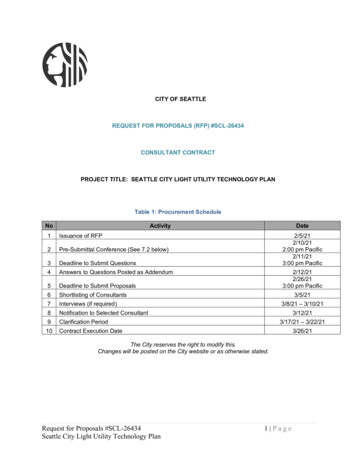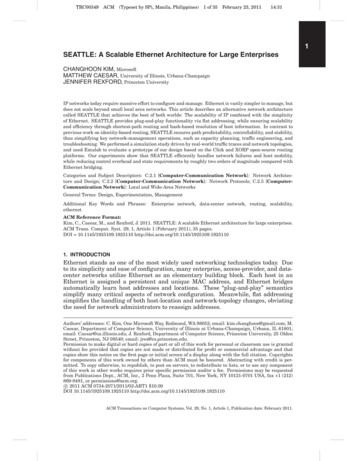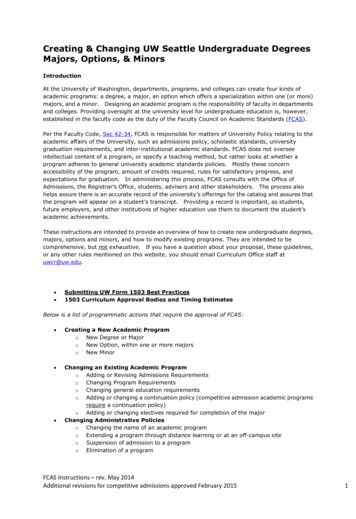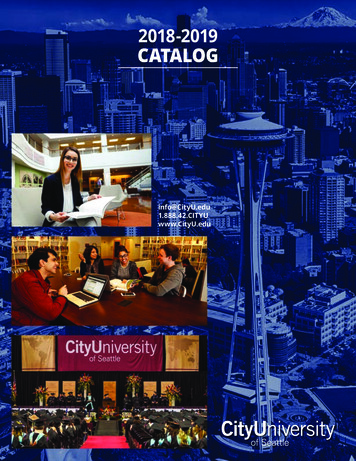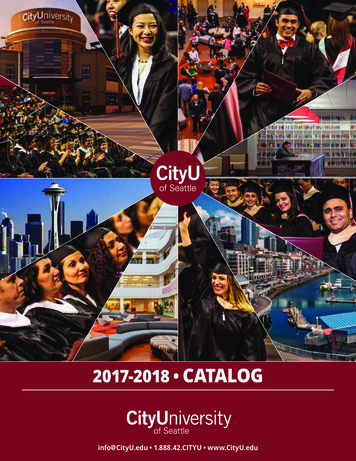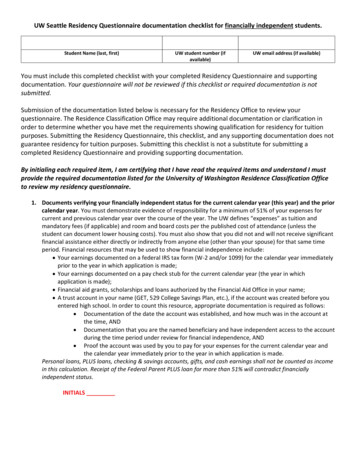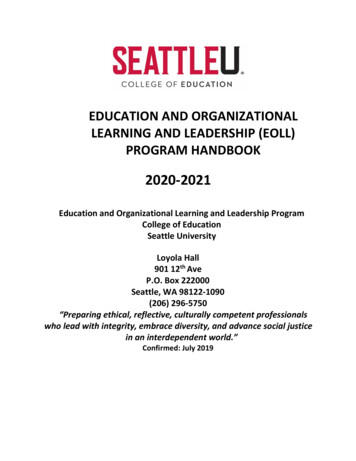
Transcription
EDUCATION AND ORGANIZATIONALLEARNING AND LEADERSHIP (EOLL)PROGRAM HANDBOOK2020-2021Education and Organizational Learning and Leadership ProgramCollege of EducationSeattle UniversityLoyola Hall901 12th AveP.O. Box 222000Seattle, WA 98122-1090(206) 296-5750“Preparing ethical, reflective, culturally competent professionalswho lead with integrity, embrace diversity, and advance social justicein an interdependent world.”Confirmed: July 2019
ContentsSection 1: Introduction . 3Section 2: Education and Organizational Learning and Leadership (EOLL) Program Office .4Section 3: College of Education Vision, Mission, Goals, Values and Core Dispositions . 5Section 4: Program Overview . 8Section 5: Getting Started in the EOLL Program . 12Section 6: Planning Your Degree . 13Section 7: Policies of Importance to EOLL Program Participants . 19Seattle University Academic Policies for Graduate Students .19Specific EOLL Doctoral Program Policies . 20Academic Integrity Policy . 20
Section 1: IntroductionWelcome to the Education and Organizational Learning and Leadership (EOLL) doctoral degree program atSeattle University. This degree program prepares ethical, reflective, and professional leaders who areculturally competent, value and understand diversity, and use evidence-based practices to work for socialjustice. Students situate their knowledge of leadership and their professional identity as leaders withintheir understandings of self, the organizations in which they interact, and global orientations in aninterdependent world. We are pleased that you have elected to develop your professional competenciesas a leader through this degree program.Faculty and administrators within the program and the College of Education have prepared this EOLLStudent Handbook to support your successful entry, continuance and completion of your doctoral degree.The Handbook has been designed to provide easy access to information and resources that are essential toyour success as a doctoral student. Read it carefully! An electronic version of this Handbook is available -resources/.In addition to this handbook, supplement this material with a thorough reading of the relevant sections ofthe Graduate School Bulletin and the Seattle University Student Handbook It is your responsibility as astudent to review, keep up to date (they are subject to revision) and adhere to them.Note that this Handbook is based on the Seattle University Graduate Catalog, the official source of allpolicies and procedures. Any discrepancies between this Handbook and the Graduate Catalog areunintentional and will be resolved using the content of the Graduate Catalog as the official and correctstatement of policy and procedure. The Graduate Catalog may be accessed at: http://catalog.seattleu.edu/.Students should obtain and keep a copy of the Graduate Bulletin of Information for the year they first enroll.It contains the specific policies which apply to their program of studies.As a doctoral student, you will find valuable information specific to the dissertation in practice process inthe EOLL Guide to Proposals and Dissertations. The Guide may be obtained from the EOLL programwebsite at: sources/.Seattle University Student Handbook and other publicationsThe Seattle University Student Handbook is available s/code-of-student-conduct/Other forms, policies and publications are available at NThe university reserves the right without prior notice to change the fees, rules and calendar regulatingadmission, registration, instruction and graduation from the university, and to change any other policy,program or regulation affecting students. Changes go into effect whenever university officials so determineand apply not only to matriculated students but also prospective students. The university reserves the rightto discontinue courses or programs at any time.This handbook contains general information. It is not a contract and statements in it should not beconstrued as a promise of specific treatment for any particular circumstance. (Seehttp://catalog.seattleu.edu/index.php)
Section 2: Education and Organizational Learning and Leadership(EOLL) Program OfficeDepartment ChairManivong J. Ratts, Ph.D.,Interim Associate Dean/Department ChairProfessor, Counselingvong@seattleu.edu (206) 296-2843Program Administrative AssistantGenet YadettaSenior Administrative Assistantyadettag@seattleu.edu (206) 296-6139Mailing AddressEducational LeadershipCollege of EducationSeattle University901 12th AvenueP.O. Box 222000Seattle, WA 98122-1090Core EOLL FacultyColette Taylor, Ed.D.Associate ProfessorProgram Director of Education andOrganizational Learning and LeadershipEmail: taylorco@seattleu.eduPhone: (206) 296-6061Trenia Walker, Ph.D.Visiting ProfessorEducation and Organizational Learning and LeadershipEmail: twalker1@seattleu.eduPhone: (206) TBABrian Robert Taberski, Ed.D.InstructorEOLL ProgramEmail: taberski@seattleu.eduPhone: (206) TBATed Kalmus, MPAInstructorProgram Director,Educational AdministrationEmail: kalmust@seattleu.eduPhone: (206) 296-5798
Section 3: College of Education Vision, Mission, Goals, Values and CoreDispositionsSeattle UniversityFounded in 1891, Seattle University has offered a values-based education in the Jesuit tradition for morethan a century. Located in the heart of Seattle, it is the Northwest’s largest and most diverse independentuniversity, with a student population of more than 7700. The 48-acre campus houses eight schools andcolleges, including the College of Education. One of 28 Jesuit Catholic universities in the United States,Seattle University draws upon the Jesuit educational philosophy to develop critical thinkers andcompassionate leaders. Teaching is the priority of Seattle University. The faculty have distinguishedthemselves through a commitment to teaching excellence. Many have achieved national and internationalrecognition for their scholarship and service, but teaching remains their primary commitment.College of EducationEstablished in 1935, the School of Education (renamed the College of Education in July 2004) was the firstprofessional degree program offered at Seattle University. Today the College of Education is a graduateonly college, offering 11 of the 24 graduate degree programs available at Seattle University, including theonly academic doctoral program. Nine of the 11 programs prepare candidates for work in K-12 settings.Conceptual FrameworkThe College of Education adopted its conceptual framework in October 2004:To prepare ethical, reflective professionals for quality service in diverse communitiesOver the ensuing years, the college developed and subsequently revised several long-range and strategicplans. The current College of Education strategic plan was approved by the faculty and dean in January 2003.However, the conceptual framework remains and is integrated into all College of Education programs andinforms the college vision, mission, and goals.VisionThe Seattle University College of Education will be an educationally excellent learning communitythat prepares professional leaders dedicated to education for justice and service to others.Mission1. The College of Education strives to be a scholarly learning community of students, staff and facultycharacterized by collegiality and collaboration.2. The College of Education strives to lead by collaboratively serving others from a grounding in theethics and values of the Jesuit tradition.3. The College of Education strives to provide a curriculum relevant to the needs of the profession,the greater society and supported by the best practice and research.4. The College of Education strives to welcome and represent the diversity of our society through itsteaching, programs, students, and personnel.5. The College of Education strives to produce graduates who are compassionate and effectiveprofessionals in their respective areas of preparation.Goals1. To prepare practitioners and policy makers to be educational leaders for a just and humane world.2. To model collegial and collaborative communities in our interactions among faculty, staff, students,and external constituencies.3. To provide leadership in teaching, learning, scholarship, service, and reflective practices.4. To increase our recognition as leaders in the profession and our influence as policymakers.
ValuesAs an educational community dedicated to service to others, the College of Education faculty and staffembrace the following values:Collaboration and Care – We are committed to our students. Our programs and curricula enablecollaboration within and among P-12 schools, colleges, universities, families, community members andorganizations.Academic Excellence – As faculty, we are outstanding teachers/scholars, dedicated to service andactively engaged in making quality contributions to their professions. The curricula we deliver arerigorous and reflect current best practices. Our curricula anticipate and create the knowledge, skills anddispositions needed for future leaders in their professions.Diversity - Our commitment to understand and respond to human differences is articulated andpracticed throughout all aspects of the programs, including admissions, curriculum and student fieldexperiences. Our programs provide opportunities to learn about the world beyond the border of theUnited States, and to learn about American society’s relation to and place in the larger world system.Faith – Our programs honor the many beliefs of our students and faculty members. Through open dialogwe seek to prepare professionals who experience the Jesuit educational traditions grounded in theCatholic intellectual tradition and appreciate multiple perspectives.Education for Justice – As a college, we have a commitment to education for justice consistent with theJesuit tradition. This includes advocacy and action with and on behalf of others and reflects beliefs inthe dignity of the human person and the rights of individuals in a just society to participate fully in sociocultural, economic and political structures that affect them.Leadership – We seek to develop responsible and reflective leaders committed to the common good.Leadership is modeled by our faculty who provide leadership in their programs, the college anduniversity and in their professional fields.Core DispositionsFaculty and staff model the values of the College of Education for our students. Through these values, weexpect students to demonstrate core dispositions of professional practice.The conceptual framework of the College of Education (to prepare ethical, reflective, professionals forquality service in diverse communities) encompasses the college’s core dispositions: ethical, reflective,professional, quality service, and diversity.EthicalThe College of Education prepares students to meet high standards of conduct and behavior for theprofession for which they are preparing. Students examine personal and professional codes of ethicsconsidering Seattle University’s and the College of Education’s values and standards of practice set forth bytheir respective professional organizations Students performing in a clinical setting, internship, orpracticum are required to demonstrate the knowledge, skills, and dispositions related to the ethicalstandards and practice of their respective professional organizations.
ReflectiveThe College of Education prepares students to be self-initiating and life-long learners who 1) integrate andextend their professional knowledge, self-understanding, and professional experience; 2) examine theirintentions, assumptions, and personal and professional goals in light of their professional experience,relevant theory, research, professional practice, and the actual outcomes of their own professional practice;and 3) create and apply new understanding from such examination. Reflection is the primary process toachieve these three professional goals.ProfessionalThe College of Education prepares students to be members of, and leaders in, their professions. Aprofessional is one who has mastered a specialized knowledge base, applies knowledge supported by bestpractice, research and theory, and abides by code of ethical standards. A professional remains current in andmakes contributions to the field. A professional also demonstrates high-level accountability and a serviceorientation within the arena of practice.Quality ServiceThe College of Education prepares students as leaders in their professions who provide high-quality serviceto students/clients and their communities. Our graduates are prepared to provide services that meet orexceed legal, ethical, and professional standards of practice, reflect validated theories and research-basedpractices, and result in positive outcomes for student/clients and their communities.DiversityThe College of Education is committed to affirming diversity among all members of its teaching-learningcommunity in order to prepare its students for culturally competent service and leadership in an increasinglydiverse society and world. Diversity is defined as the many dimensions of commonalities and differencesthat broadly encompass the multiplicity of cultures and perspectives. The intent is to create equitable andinclusive arenas that embrace the full spectrum of all community members’ contributions and provideoptimal access to services, resources, and opportunities.
Section 4: Program OverviewInstitutional ContextThe EOLL program at Seattle University is located within the Department of Leadership and ProfessionalStudies in the College of Education. Seattle University, founded in 1891, is the largest and among the mostdiverse independent universities in the northwest. As a Jesuit institution, the university seeks to developcritical thinkers and compassionate leaders.The College of Education, one of nine colleges and schools within the university, is a graduate college offering11 different degree programs and 1 undergraduate degree. The college prepares ethical and reflectivepractitioners for quality service in diverse communities. EOLL program participants will have the opportunityto work with many different faculty members across the college through course work and research projects.The doctoral degree concentrations draw upon faculty expertise across programs.Program HistoryThe EOLL Program initially referred to as EDLR program at Seattle University has a long and distinguishedhistory. Since its creation in 1976 it has produced more than 500 graduates who hold leadership positionsthroughout the region, state, nation, and world. Seattle University mounted the first academic doctoralprogram in an independent university in the state of Washington in July of 1976 with a cohort of 27students. Dr. John Morford served as the Dean of the College of Education and was the EDLR program’s firstchair, serving as senior professor of educational leadership from 1977 through 1991. Over the years, theprogram has attracted a diverse group of students with respect to gender, age, culture, race/ethnicity,ability, and employment identity. Prior program participants have been selected for Fulbright Fellowshipsand graduates have received outstanding dissertation awards from their national/internationalprofessional associations. The program changed its name in Education and Organizational Learning andLeadership in September 2020.Carnegie Project on the Education Doctorate (CPED) FrameworkIn 2014, the College of Education was selected for membership in the highly respected CPED and beganthe process of revising the program under the CPED framework and guiding principles for program design.Under those guidelines, the Seattle University professional doctorate in education: Is framed around questions of equity, ethics, and social justice to bring about solutions to complexproblems of practice.Prepares leaders who can construct and apply knowledge to make a positive difference in the livesof individuals, families, organizations, and communities.Provides opportunities or candidates to develop and demonstrate collaboration andcommunication skills to work with diverse communities and to build partnerships.Provides field-based opportunities to analyze problems of practice and use multiple frames todevelop meaningful solutions.Is grounded in and develops a professional knowledge base that integrates both practical andresearch knowledge, that links theory with systemic and systematic inquiry.Emphasizes the generation, transformation, and use of professional knowledge and practice.
Program FoundationsThe doctoral program in education and organizational learning and leadership prepares ethical, reflective, andprofessional leaders who are culturally competent, value and understand diversity, and use evidence-basedpractices to work for social justice. Students situate their knowledge of leadership and their professionalidentity as leaders within their understandings of self, the organizations in which they interact, and globalorientations in an interconnected world.Learning goals establish the student characteristics that are evident in successful program graduates. As aresult of successful completion of the Seattle University EOLL Program, graduates are: Ethical leaders in service to their organizations and communities. Reflective leaders who integrate theory and research for effective practice. Competent professional leaders in their chosen fields. Culturally competent leaders in an interdependent world.These learning goals describe the leader the program strives to develop as value centered, committed to serviceand social justice for the common good; professional, reflective, holistic, interdisciplinary, creative, visionary, andscholarly; effective interpersonally and as a leader in organizations; and both committed to and possessing theconceptual knowledge and skills to lead in diverse communities and in an interdependent world.In alignment with Seattle University's graduate student outcomes, the program has identified studentoutcomes that create a framework for curriculum design and program assessment. These desired studentcharacteristics are developed through multiple experiences within the degree program. EOLL successfulprogram graduates are able to: Demonstrate ethical standards in all leadership practices. Demonstrate responsiveness to the varying needs of communities and organizations and work withdiverse populations constructively. Develop practical leadership skills to build effective team-oriented approaches throughcollaboration and consensus building. Exhibit leadership behaviors such as effective strategic thinking, problem solving, reflection, andcommunity building. Develop skills for designing, critiquing, and implementing relevant research to affect practice,advance social justice, and enact effective change. Create responses to changing community, organizational, and group environments and problems,creat
Founded in 1891, Seattle University has offered a values-based education in the Jesuit tradition for more than a century. Located in the heart of Seattle, it is the Northwest’s largest and most diverse independent university, with a student population of mor
